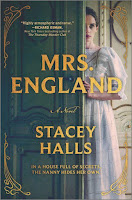 Stacey Halls was born in Lancashire and worked as a journalist before her debut, The Familiars, was published in 2019. The Familiars was the bestselling debut hardback novel of that year, won a Betty Trask Award and was shortlisted for the British Book Awards' Debut Book of the Year. The Foundling, her second novel, was also a Sunday Times top ten bestseller. Mrs. England is her third novel.
Stacey Halls was born in Lancashire and worked as a journalist before her debut, The Familiars, was published in 2019. The Familiars was the bestselling debut hardback novel of that year, won a Betty Trask Award and was shortlisted for the British Book Awards' Debut Book of the Year. The Foundling, her second novel, was also a Sunday Times top ten bestseller. Mrs. England is her third novel.
At CrimeReads Halls tagged six favorite novels in which "[p]ower, control and deception aren’t just plot devices: they’re part of the reader experience." One title on the list:
Rebecca, by Daphne Du MaurierRead about another entry on the list.
‘Last night I dreamt I went to Manderley again.’ In the novel that begins with one of the most famous first lines of all time, our nameless narrator meets and marries the enigmatic widow Max de Winter after a whirlwind courtshipin Monte Carlo. Embarking on life as the mistress at the gothic Cornish mansion Manderley, the servants do not accept the second Mrs de Winter, who begins to feel more haunted by the day by her predecessor. As Max becomes more withdrawn and less tolerable of her childish quirks, the walls start to close in as she realises Rebecca might be buried, but she is far from dead. Du Maurier wrote that she was aiming for ‘slow-burning menace’ with this, her breakout novel, which doesn’t let up its simmering, sinister atmosphere from open to close, and remains the ultimate masterclass of a portrait of a young woman driven mad by love and fear.
Rebecca appears on Veronica Bond's list of six great Gothic castles from literature, L.C. Shaw's list of nine of the most memorable antagonists in fiction, Eliane Glaser's list of six of the best books on leadership, Penelope Lively’s list of five of her favorite gardens in literature, Xan Brooks's top ten list of terrible houses in fiction, Tom Easton's top ten list of fictional "houses which themselves seem to have a personality which affects the story," Martine Bailey's list of six of the best marriage plots in novels, Stella Gonet's six best books list, John Mullan's list of ten of the best conflagrations in literature, Tess Gerritsen's list of five favorite thrillers, Mary Horlock's list of the five best psychos in literature, and Derwent May's critic's chart of top country house books.
--Marshal Zeringue





